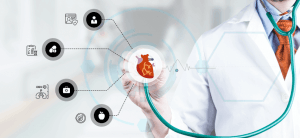Healthcare is one of our priority Industry verticals. And IoT is our collective passion area. We have been keeping a tab on various advancements in the usage of IoT in healthcare ecosystem (the industry, personal healthcare, and healthcare payment applications). Here is a few learning that will hopefully accelerate the pace of “Connected Healthcare”.
It is expected that 87% of healthcare organizations will be using IoT in some manner. Currently, most IoT Healthcare initiatives provide improvement of care as such with remote monitoring and telemonitoring as main applications. Another area is tracking, monitoring and maintenance of assets, using IoT and RFID. This is done on the level of medical devices and healthcare assets, the people level and the non-medical asset level (e.g. hospital assets).
However, these deployments and use cases are currently being building implemented mostly in the developed world and for large corporate hospitals. There are more exotic and advanced experiments with applications like smart pills, smart home care, personal healthcare, robotics, and Real-Time Health Systems (RTHS).
3 key patterns are driving all these initiatives.
- There is increasing consciousness and engagement of consumers with regards to their health.
- Various healthcare ecosystem players are working to fulfill the demand for remote and home possibilities with novel approaches and partnerships.
- All the players in the ecosystem and the payers( Government, Insurance Companies and Consumers) want a reduction in healthcare expenditure, along with better quality care.
Here are the key challenges that the industry needs to overcome.
- Data Security – According to the 2017 Thales Data Threat Report, healthcare edition, 30 percent of healthcare organizations use IoT for health sensitive data. With data security protocols yet to be made stronger and stronger patient privacy laws already in place, providers will be wary of adapting IoT soon.
- Respect for personal data in healthcare IoT – Various regulations across the globe drive the compliance agenda, yet healthcare data security needs to go beyond compliance. At the same time, healthcare organizations need to pay more attention to compliance as well, certainly in regions where stricter regulations are being put into place such as the EU GDPR where personal health data, as well as genetic and other medical and biological data, get special attention and are seen as very sensitive.
- B2C vs. B2B Healthcare IOT – Most of the current developments in Healthcare IOT are focused on improving the quality and frequency of interaction between consumer/patient and healthcare providers and payers. Outside of this scope, there is major growth ahead in a more Industrial Internet of Things context, whereby healthcare providers, such as hospitals, leverage IoT, in combination with applications and technologies in the field of robotics, artificial intelligence, and Big Data. This ecosystem is not growing as fast as the B2C IoT.
- The Internet of Things and healthcare information systems – In a health data context data from medical devices and monitoring systems ultimately ends up inElectronic Healthcare Records (EHR) Systems or in specific applications which are connected with them and send the data to labs, doctors, nurses and other parties involved. As health-related data is collected and increasingly is available in real-time, it gets integrated with electronic healthcare records (EHR).EHR systems are far from omnipresent and most have not been designed with the Internet of Things, RFID and real-time data in mind; they have been designed, if at all, to make healthcare faster, more patient-centric, more affordable from the perspective of the patient’s health and also to make the work of healthcare professionals easier and simpler, based on rather static data. Would love to hear your comments/feedback. Happy to collaborate and partner in any initiative that helps improve the cause of IoT in Healthcare and improves the quality of healthcare in the developing world.
For More Information on IoT in healthcare please speak to us.
